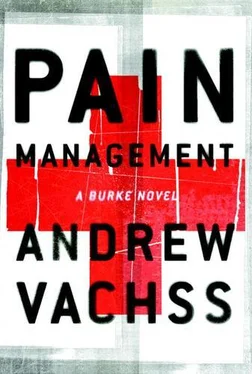“Your brother’s right,” I told Jennifer. “And I think I know how I can fix it. But to do that, I need to talk to your father. Alone.”
She gave Joel a glance. He nodded. “Let’s go out in the backyard,” he said to me. “Be nice to be outside when it’s not raining, for once.”
“You can smoke out here,” he said, taking a seat on a redwood bench that circled a good-sized table made out of the same stuff.
“I don’t smoke,” I told him, setting the stage.
“When did you quit?”
“A long time ago. Smoking . . . looking like I’m smoking . . . is just another way of making sure people don’t know me as good as they think they do.”
“And that’s important to you?”
“I couldn’t do my work without it,” I said. “But sometimes I need people to trust me. Like now. If they don’t know me, there’s only one way to get that to happen.”
“Which is?”
“You’re worried that I might be lying. Might be working for Kevin so hard I’d say . . . do anything to get my hands on his daughter. I could sit here, tell you my whole life story. And if you believed it, maybe you’d believe me. Maybe not. Your whole life, it’s about making guesses, right? Educated guesses, sure. But . . . you said you were a forensic psychologist. I know what that means. At some point, you have to stand up—in court, before a parole board, maybe before Congress, for all I know—and say something that’s a guess. Only, coming from you, from a professional, it’s got to be a good guess. That’s what people pay you for, am I right?”
“If you mean I get paid for professional opinions, yes.”
“But they’re still guesses, doc. Good guesses, I’m sure. But . . .”
“But they’re all judgment calls, to some extent, yes.”
“And you’ve made some judgment calls about me. Otherwise, I’d never get within a hundred yards of your daughter, much less invited into your home.”
“Some judgments,” he acknowledged, making it clear he wasn’t finished adding up the score.
“If you had time to know me—or if I had the kind of references you could check—maybe there’d be another way. But there’s not. There’s no time. So I’m going to give you something else.”
“What?”
“A hammer. One you can drop on me anytime you think I lied to your daughter about what I’m up to with Rosebud.”
“You’re being oblique. And it’s late. . . .”
“Check the ER admissions for the past couple of weeks, doc. I know you can do that. You’ll find some guy was brought in, all pounded to hell. Big deal. But this guy, somebody chopped off the tips of his fingers. His two index fingers.”
“And you know this because . . . ?”
“Because I did it,” I told him, keeping my voice matter-of-fact.
“All right,” he said, not reacting. “And why—?”
“Listen to me, doc. Why I did it doesn’t matter. This guy, he refused to talk to the cops. His boss, the one who was running him, he wouldn’t have wanted that. But now this boss, he’s not around. And this guy, he might be scared enough to say some things.”
“Things about you?”
“No. People remember their nightmares, but not the monsters in them. Not unless they know them from real life. He’d never seen me before. The only people who actually know who did that miserable little freak are me . . . and you,” I lied, smoothly.
“But,” he said, leaning back slightly, “if you’re not giving me the facts, what good would it do me to go to the police? They wouldn’t have enough to hold you.”
I leaned into the space between us. “They would when my prints fell, doc,” I said. “And you already have those.”
He seemed comfortable with the silence surrounding us. But it was no test of my patience. Dark and quiet. Safe. I could have stayed there for weeks.
“You think you know, don’t you?” he finally asked me.
“Know what?”
“Whatever drove Rose out of her house. Whatever’s going on with her and her father.”
“Yeah.”
He took a deep breath. Let it out. Held my eyes. “It’s not always that,” he said.
“I have what you want,” Gem greeted me as I walked in the door. “What you wanted, anyway.”
“Speak English,” I answered her. I don’t like it when people get ugly sideways; it always hurts less when they strip away the disguises and come straight ahead.
“The information from that computer you . . . investigated,” she said, ocean eyes innocent. “Remember, I told you it would take some time?”
“Yeah,” I said, sitting down at the kitchen table. “I remember.”
“There was a lot to decipher,” she said. Catching my look, she went on quickly: “I don’t mean it was in code, or anything like that. There was just a huge volume of information. Apparently, your . . . target is a man who never erases anything from his hard drive. My . . . The person I used said that it hadn’t even been defragged in probably years.”
“Did he use it for e-mail, too?”
“Yes. And browsing. Very unsophisticated. He used a dial-up, and went to the Web direct through his ISP.”
“Any Daddy-Daughter stuff?”
“Daddy-Daughter?”
“Incest. He visit any incest sites? Or kiddie stuff?”
“No,” she said, her voice measured.
“Corporal punishment, spanking—”
“ Sex spanking?”
“Yeah. Most of those sites make it clear they don’t play with kids, but some of them . . .”
“No. Nothing like that. He did seem to have an interest in bondage, but only in pretty mild stuff.”
“No asphyx-sex?”
“Nothing even close. But he did have a number of images downloaded. Always of men . . . restrained in some form or fashion.”
“You think he’s gay?”
“No. A trace-back showed that he got the images from dominatrix sites. As I said, very light. If he wanted heavier, it’s out there. And if he got as far as he did, he could have gone the rest of the way.”
“Is that the only thing he browsed for?”
“Oh no. It wasn’t even the majority, not by a long shot. He was very interested in politics and crime, especially where they intersected.”
“Yeah, he’s a major-league lefty, I know,” I said, thinking of the Geronimo Pratt book he’d marked up so much.
“It would seem so.”
“You don’t sound very enthusiastic.”
“Not about . . . that. As I said, Mr. Carpin was something of a slob with his computer. So, if there was anything . . . bizarre about his tastes, I believe the trail would still be there.”
“Maybe he had more than one computer. Or he’s smarter than you’re giving him credit for.”
“I don’t think either one,” she said, holding up a thick stack of paper. “Because his banking records are all here.”
“Damn! You sure?”
“I cannot be certain he does not have other banking records,” she said tartly. “But his personal checking account, his savings account, his 401(k)—it is all here.”
“Did he—?”
“He paid all his bills by personal check, as near as I can determine,” she interrupted, reading my mind. “I have spent several days going over them. Here, take a look.”
I got up, moved to where she was sitting, her body covered in paper from the waist down.
“You said there was a phone in his office . . . ?” she asked.
“Yeah. Real fancy one, too. Top-of-the-line. And a lot of recording equipment connected to it, too.”
“But there is no bill for it,” she said, a faint smile playing on her lips.
“How do you know that?”
“Because he logs all his bills. He uses one of the accounting programs that come pre-loaded on many computers. There are four telephone lines—that is, lines with individual numbers—coming into his house. Each with numerous extensions. But the line in his office has no extensions. What you saw was the only connection. And Qwest bills him only for three of the numbers.”
Читать дальше











